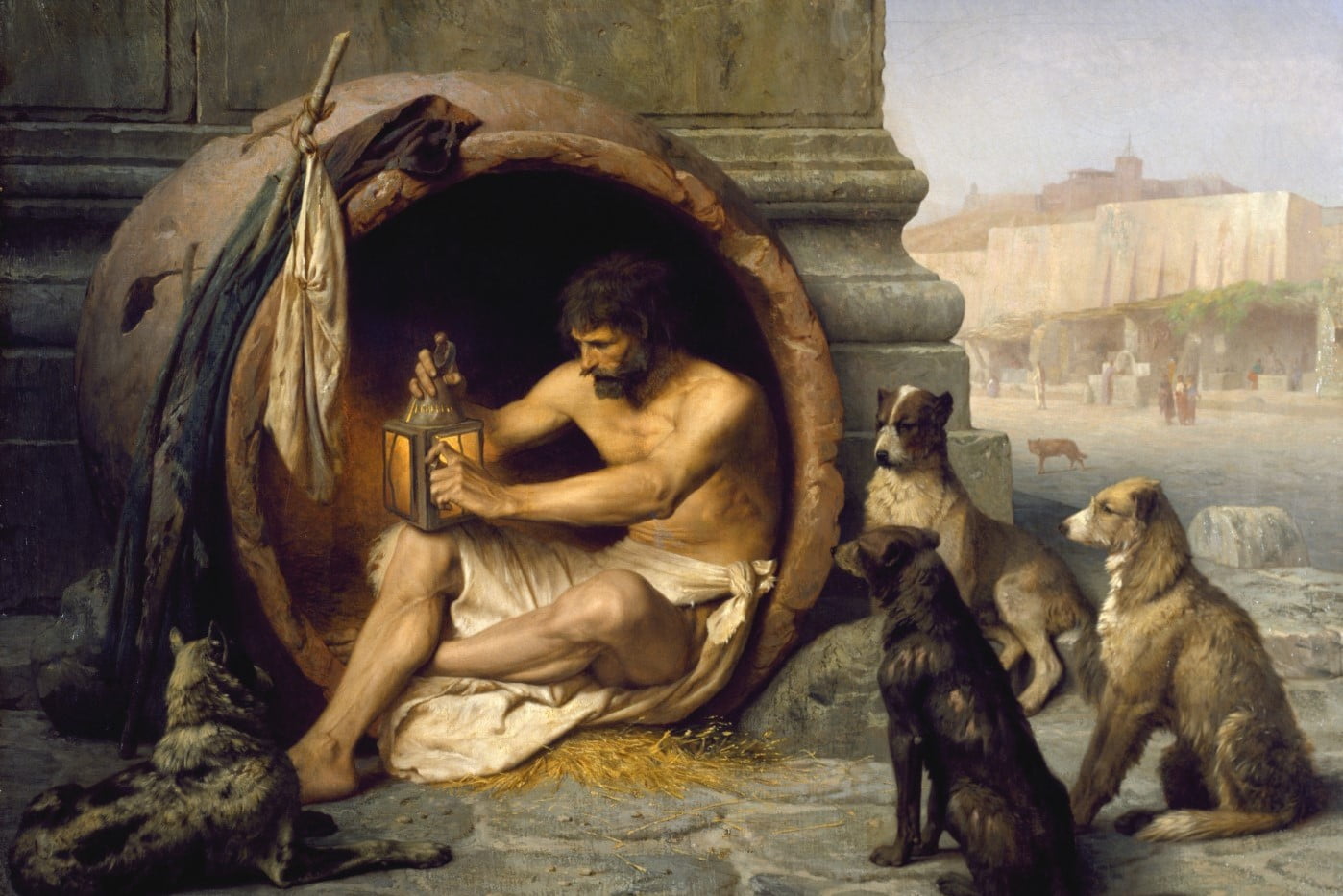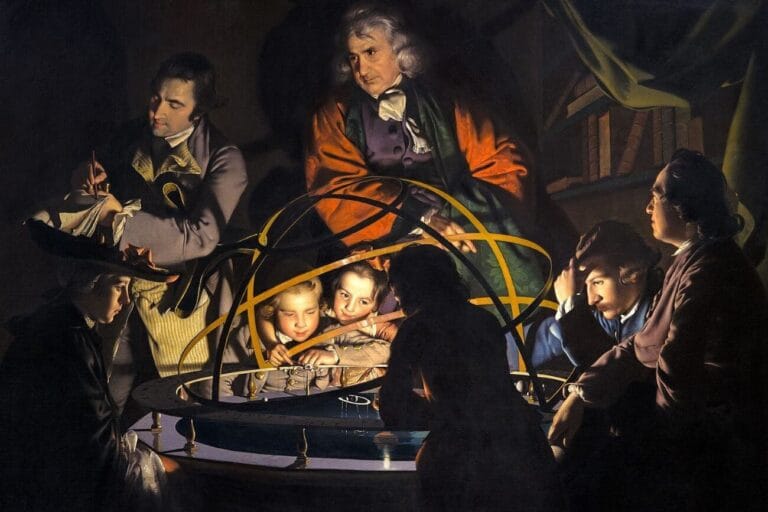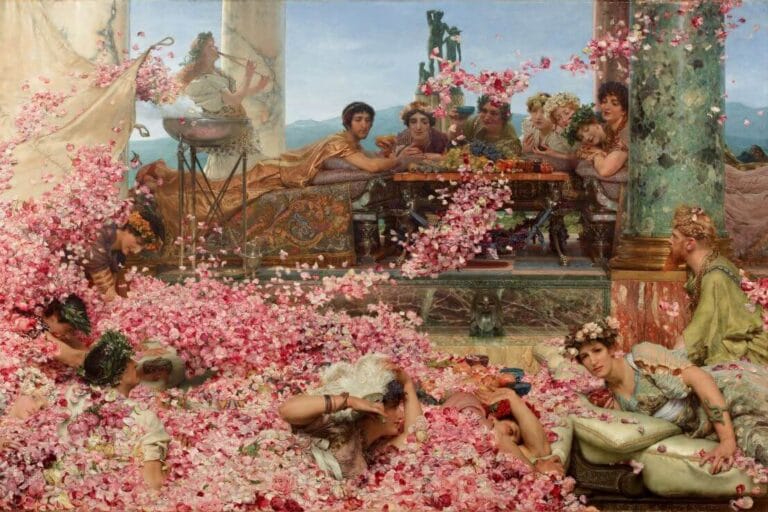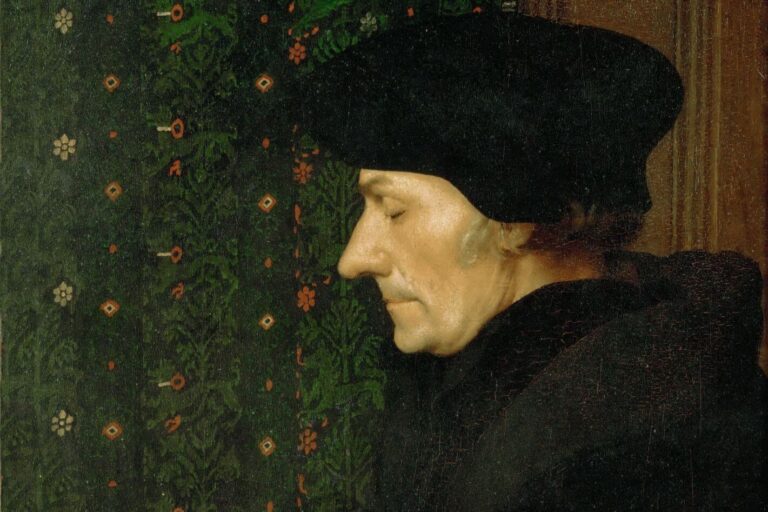Diogenes of Sinope was an ancient Greek philosopher and the founder of the Hellenistic school of philosophy called Cynicism. Born as the son of a banker in the Ionian colony of Sinope, on the coast of the Black Sea, Diogenes later settled down in Athens, possibly having been exiled or fleeing from political upheaval. He was known for living a life without shame, ridiculing many conventions of the Athenians. He famously lived in a storage-jar (a pithos) in the marketplace, begging for food, relieving himself on the streets, and even masturbating in public, as we read in the account of the famous biographer Diogenes Laertius.
“It was his practice to do all things in public, including those connected with Demeter and Aphrodite. He would thus argue as follows: ‘If taking a meal is nothing improper, then neither is that improper in the market-place; now taking a meal is in fact nothing improper, so neither is it improper to take one in the market-place.’ He would regularly masturbate in public and used to say, ‘If only one could put an end to hunger by rubbing one’s stomach!'”
Diogenes Laertius, Lives of the Eminent Philosophers 6.69 (trans. Robin Hard)
Just like the other Hellenistic schools, such as Stoicism and Epicureanism, the Cynics were primarily interested in the question how to improve one’s life. They agreed eudaimonia (‘happiness’) was the highest good, but they had a different view on how to attain it, for – rather than endlessly philosophizing about virtue – the Cynics simply endeavoured to live like dogs, without shame and in accordance with nature. Hence the name Cynicism, from the Greek kunikos, ‘dog-like’.

An Uncompromising Philosophy
Like Socrates, Diogenes believed that it was the role of the philosopher to point out people’s weaknesses, as a doctor of the soul, and he was equally uncompromising in doing so. Living in Athens as a contemporary of Plato and Aristotle, Diogenes ridiculed his fellow philosophers, no matter how renowned, for wasting their time on abstract rather than practical matters. Thus he allegedly made fun of Plato’s theory of ideas.
“When Plato was once talking about his Ideas and used the terms ‘tableness’ and ‘cupness’, Diogenes remarked, ‘I can see a table and a cup, but in no way this tableness and cupness.'”
Diogenes Laertius, Lives of the Eminent Philosophers 6.53 (trans. Robin Hard)
You might be an expert in your field, but what does it matter if you do not know how to live? In this vein, he similarly criticized other professions for neglecting the things that truly matter in life, for not seeing what is right in front of them.
“He marvelled that the grammarians should enquire into the misfortunes of Odysseus while remaining ignorant of their own; that the musicians should tune the strings of their lyre while allowing the disposition of their soul to remain out of harmony; that the mathematicians should gaze up at the sun and moon and yet fail to see what lies beneath their feet; that the orators should be so earnest in praising justice and yet never practice it.”
Diogenes Laertius, Lives of the Eminent Philosophers 6.27-28 (trans. Robin Hard)
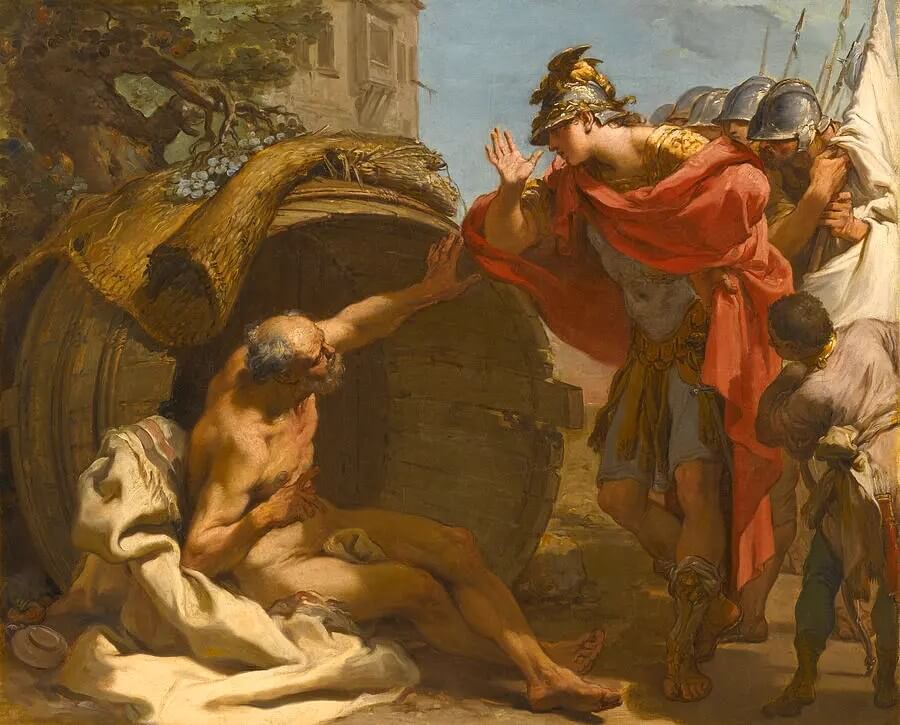
Diogenes’ uncompromising and anti-authoritarian attitude becomes most clear in the famous anecdote of Alexander the Great visiting Diogenes. The Cynic philosopher was not impressed by his appearance, if we are to believe Plutarch, staying true to his philosophy by disregarding wealth, power, and status.
“Alexander paid him a visit and found him relaxing in the sun. Diogenes raised himself up a bit when the huge crowd of people appeared and looked at Alexander, who greeted him and asked him if there was anything he wanted. ‘Yes,’ replied Diogenes, ‘move aside a little, out of my sunlight.’ The story goes that Alexander was so struck at being held in such contempt, and so impressed with the man’s haughty detachment, that while the members of his retinue were ridiculing and mocking Diogenes as they left, he said, ‘But as for me, if I were not Alexander, I would be Diogenes.'”
Plutarch, Alexander 14 (trans. Robin Waterfield)
Living Like a Dog
Diogenes provocatively viewed the dog (kuon) as his role model, because it lived in accordance with nature: disregarding conventions, neglecting luxury, and knowing no shame. Like a dog, he aspired to have no shame, by eating, relieving oneself, and even masturbating in public. Diogenes did not want to worry about anything other than his basic needs, such as food and safety.
“The people of Athens called Diogenes ‘the Dog’ because he made the ground his bed and would spend the night in the streets in front of doors; but Diogenes liked this nickname because he saw that it was appropriate to the way he treated himself.”
Themestius, On Virtue 43 (trans. Robin Hard)
Imitating the dog’s way of living, Diogenes only wanted to worry only about the present, in order to be free of worry about the future. He depended on no one but himself, and he sought to live in accordance with nature rather than with the laws and customs of a particular state. When asked where he was from, Diogenes therefore said, ‘I’m a citizen of the world.’ In a way, Diogenes thus was one of the first cosmopolitans.
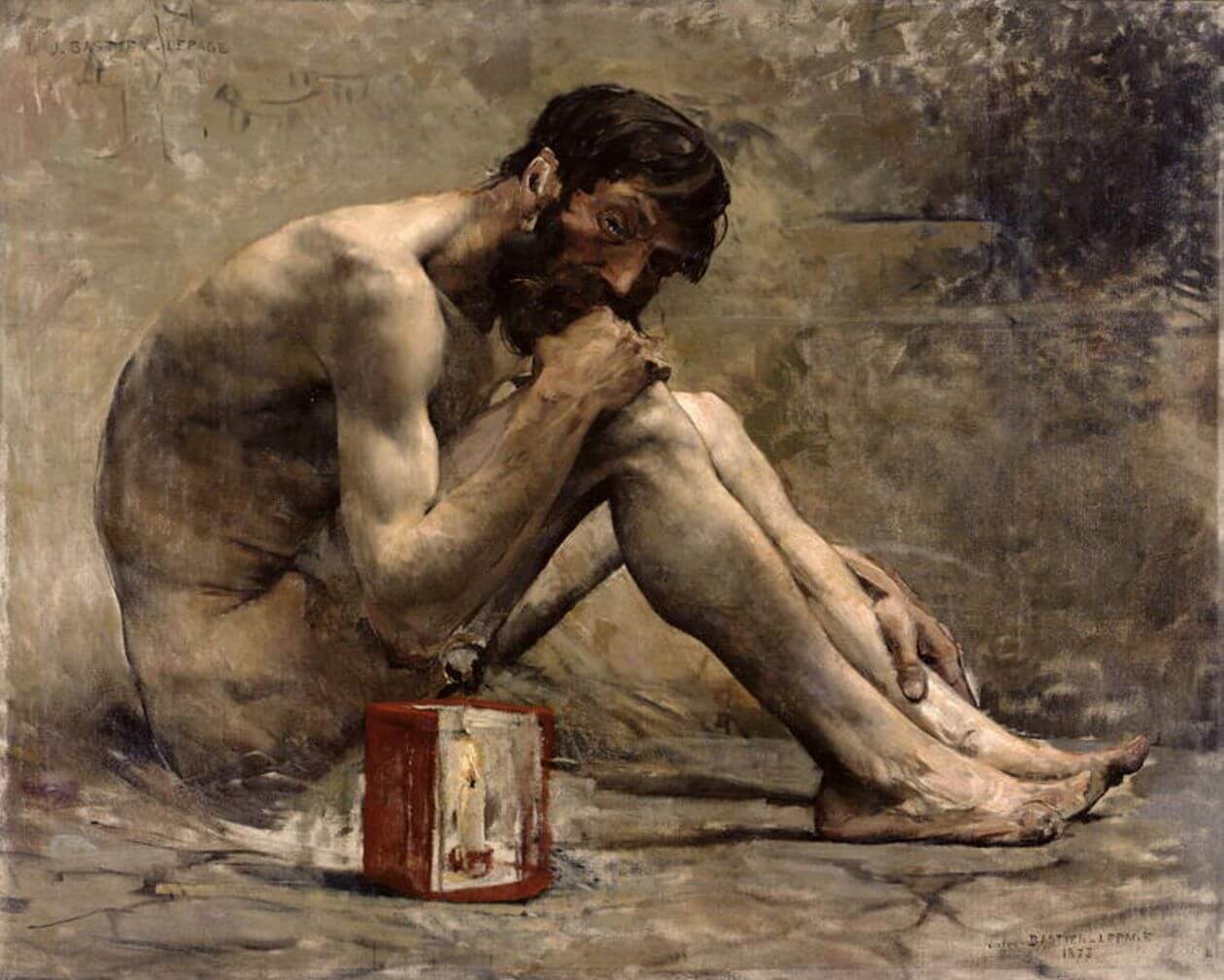
Living like a dog not only meant living a shameless life, but also living a simple life. There are some wonderful anecdotes attesting to his sober way of living like this one by written down by Jerome.
“For a time he used a wooden cup for drinking, but on seeing a boy drinking from the hollow of his hand, he smashed his cup on the ground saying, ‘I hadn’t realized that nature had provided me with a cup.”
Jerome, Against Jovinian 2.14 (trans. Robin Hard)
Diogenes believed that nature provides for everything a man needs. Everything else merely distracts from what truly matters. The next anecdote reflects the radical autonomy that he aimed to attain.
“When he once arrived at a customs post, he was asked whether he was carrying any valuables, and replied that indeed he was. On failing to find anything in his search, the customs official accused Diogenes of making fun of him; but he bared his chest and declared, ‘I’m carrying this vessel filled with any number of good things, but you are unable to see them because you keep the eyes of your soul firmly closed.”
Codex Patmos 263 (trans. Robin Hard)
In similar fashion, Diogenes is reported to have allegorically walked around Athens with a lamp in hand, saying, ‘I’m searching for a man’. Lighting a lamp in daylight is a proverbially futile endeavour, just as his search for a virtuous man is futile, because no one knows what it means to be human. Everyone is speaking of noble virtues and worthy endeavours, but only few dare put it into practice.
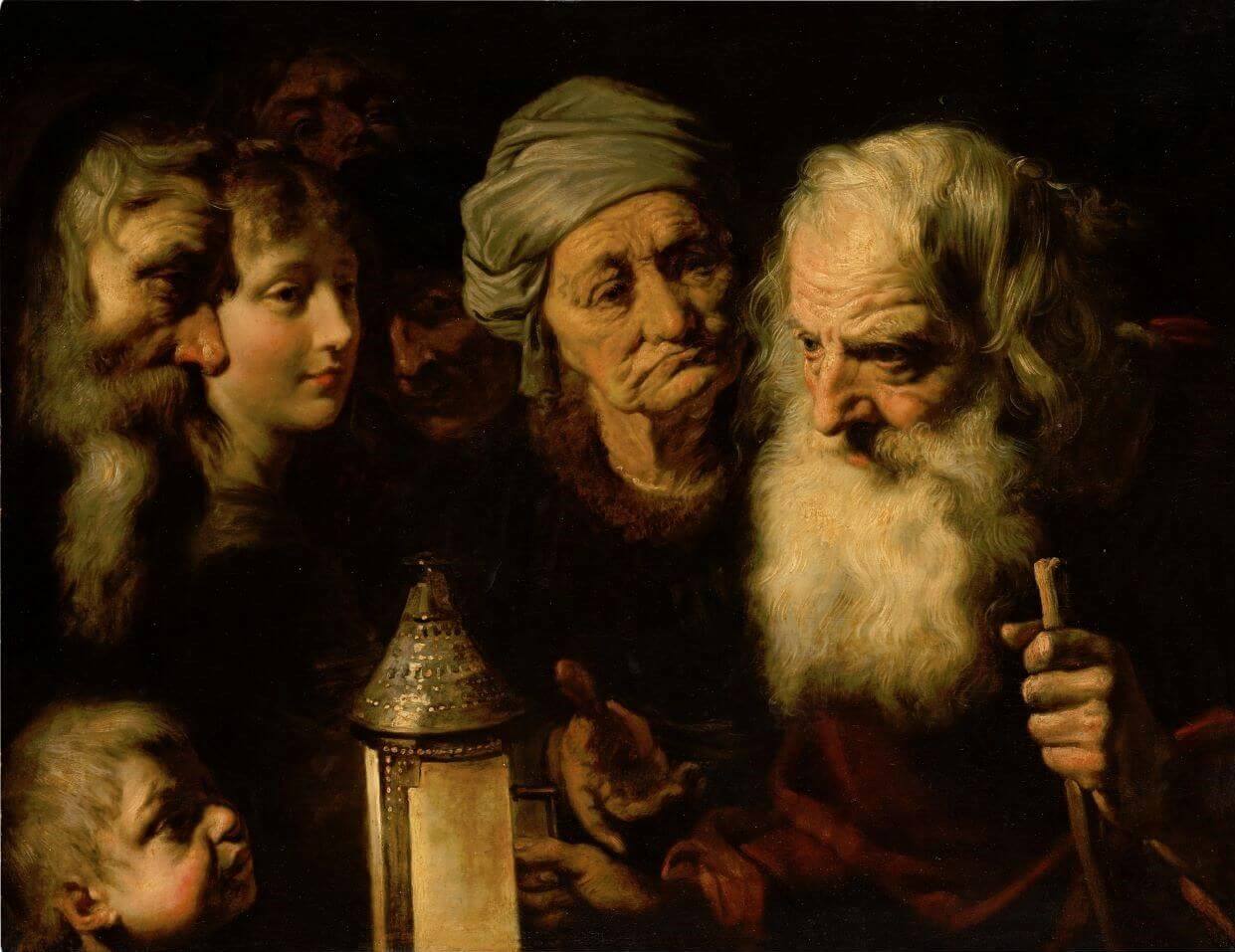
Further Reading
Throughout this article, I made extensive use of Robin Hard’s wonderful selection and translation of Diogenes’ testimonials, called Diogenes the Cynic: Sayings and Anecdotes (Oxford World’s Classics). Diogenes Laertius’ Lives of the Eminent Philosophers is also excellent, if you are interested in Diogenes or ancient Greek philosophy in general. Furthermore, the comic book The Philosopher, the Dog and the Wedding by Barbara Stok about the Cynic philosophers Crates and Hipparchia is an entertaining and well-researched introduction to the philosophy of the Cynics.
